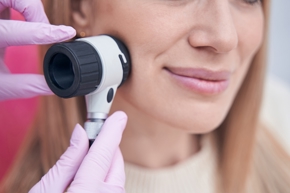Dermatology
*** Please note - All appointments are to be booked at The Private Medical Group's website:
www.theprivatemedicalgroup.co.uk
At The Private Medical Group, our Dermatology services are dedicated to diagnosing and treating a wide range of skin conditions, from common issues like eczema and psoriasis to more complex concerns and low-risk skin cancers.
Our experienced clinicians provide thorough assessments and tailored treatment plans to patients of all ages, ensuring that you receive expert care in a supportive and professional environment.
Whether you’re seeking answers for a persistent skin problem or need an expert opinion, our Dermatology service offers reliable and comprehensive care to help you manage your skin health with confidence.
Acne
 Acne presents for the majority of us during our teenage years. However, a significant number of adults continue to suffer throughout their life. Multiple factors affect acne including medication, hormones and lifestyle.
Acne presents for the majority of us during our teenage years. However, a significant number of adults continue to suffer throughout their life. Multiple factors affect acne including medication, hormones and lifestyle.
Acne can be managed by different interventions, including the use of cleansing and cosmetic products, through to prescribed creams and tablets.
Two simple steps you can take to help improve your acne include using a soap-free cleanser and an oil-free moisturiser; these are often marketed as ‘non-comedogenic’ or ‘acne-free’.
No one management strategy for acne suits all patients, so it is important to discuss these with a specialist.
Eczema and Psoriasis
 The two most common inflammatory skin conditions in the UK, characterised by red, dry and itchy skin, are eczema and psoriasis. Both of these conditions can be seen at any age and cause significant discomfort and distress; impacting on both daily life and sleep for many patients.
The two most common inflammatory skin conditions in the UK, characterised by red, dry and itchy skin, are eczema and psoriasis. Both of these conditions can be seen at any age and cause significant discomfort and distress; impacting on both daily life and sleep for many patients.
There are many products which can help manage eczema and psoriasis, from the use of soap-substitutes, moisturisers, topical, oral and injectable therapy as well as interventions such as the use of phototherapy (light therapy). Our specialists can guide you through these options.
Avoiding soap and applying a regular moisturiser can make a huge difference to inflammatory skin conditions. Even if stronger products are required, they will be far more effective if applied to skin which has been well moisturised during the day.
Allergic skin conditions

The association between skin and allergy is both real and complex. There are multiple considerations when a patient presents with a possible skin allergy.
Conditions such as allergic contact dermatitis, irritant contact dermatitis, atopic dermatitis, urticaria, angioedema and anaphylaxis all present with different signs and symptoms.
At the Private Medical Group we are able to offer initial assessment and discussion regarding the most appropriate management and investigation for your allergic skin condition.
Concerning skin lesions
New or changing skin lesions should prompt urgent expert assessment. Lesions which develop rapidly, appear to be changing, are not healing or bleed intermittently may show the early signs of a skin cancer. Urgent assessment should utilise dermoscopy (a hand-held microscope) to assess lesion structures including pigment and vessels; please see further information on dermoscopy below.
Where a lesion of concern is noted, this may require a small surgical procedure called a skin biopsy (removing a small sample) or excision (complete lesion removal) for laboratory analysis; further information regarding skin surgery can be found here.
Patients looking for a way of monitoring their moles on an ongoing basis will benefit from mole mapping. Mole mapping is a process used to track and monitor skin lesions, particularly to identify any changes that could indicate the development of skin cancer. It involves taking high-definition photographs of all skin lesions on a person’s body; images are then repeated to track changes over time.

The following patients may benefit from mole mapping:
- Personal history of skin cancer
- Family history of skin cancer
- History of significant sun exposure
- Previous sun bed use
- Previous sun burning
- Multiple moles
- Those wanting to accurately track changes in their skin lesions
Dermoscopy

- The pattern of pigmentation
- The structure of blood vessels
- The presence of irregularities under the skin’s surface
It is especially useful for detecting early signs of melanoma (a type of skin cancer) and distinguishing between benign and malignant growths. At The Private Medical Group all skin lesions are assessed by dermoscopy, this allows us to make an accurate assessment of lesions and can often avoid the need for a biopsy by providing a clearer view of whether a lesion is suspicious.
Cryotheraphy
 Cryotherapy is a treatment that involves using extreme cold to destroy and remove abnormal tissue. The process works by freezing and killing unwanted cells, which can be useful in treating various skin conditions including warts, precancerous lesions, and some skin cancers.
Cryotherapy is a treatment that involves using extreme cold to destroy and remove abnormal tissue. The process works by freezing and killing unwanted cells, which can be useful in treating various skin conditions including warts, precancerous lesions, and some skin cancers.
During the procedure a cold liquid is applied which rapidly freezes the skin and evaporates; this process takes a matter of seconds. The process can be repeated depending on the nature of the lesion being treated.
After treatment, the area may swell, blister, or scab over as it heals; in most cases healing will occur over a couple of weeks. We will provide full information before the procedure and post-treatment care instructions.
